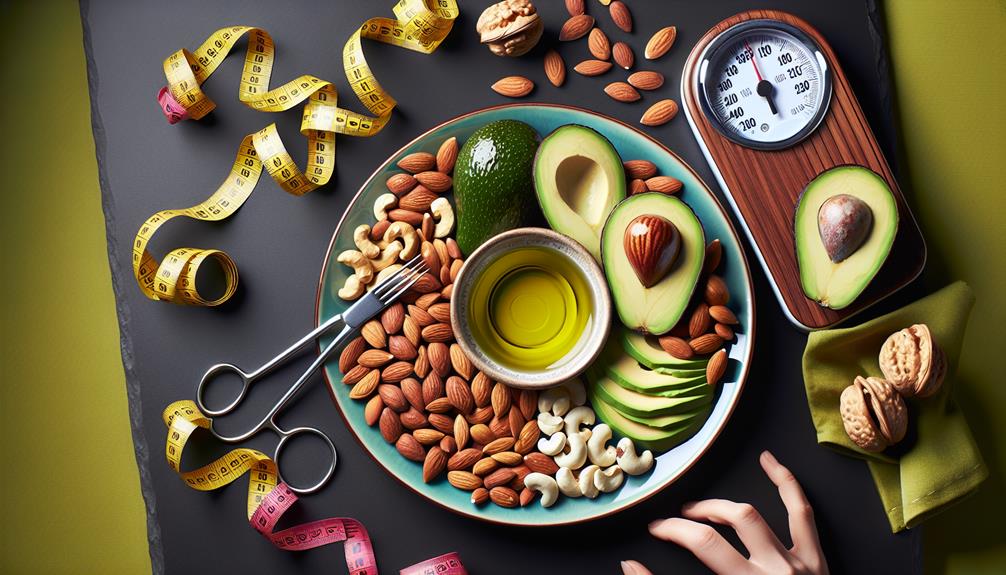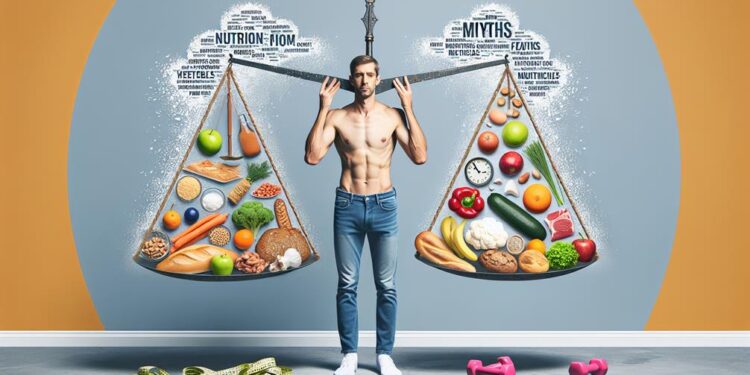In the world of fitness nutrition, myths can be like mirages in the desert—seemingly real but ultimately misleading. You may have heard that carbs are the enemy, or that protein overload is the key to gains. But have you stopped to consider if these beliefs are truly based on facts?
Let's unravel the truths behind these common misconceptions and discover how they might be impacting your health and fitness goals. Are you ready to separate fact from fiction and optimize your nutrition for better results?
Key Takeaways
- Not all carbs are equal; they aid in muscle recovery and energy.
- Excessive protein doesn't guarantee muscle gains; balance intake for growth.
- Healthy fats support overall health and don't directly cause weight gain.
- Timing meals around workouts and choosing quality supplements optimize fitness results.
Carbs Are the Enemy
While some popular diets may demonize carbs, it's important to understand that not all carbohydrates are created equal. Carbs aren't inherently evil; they play a crucial role in providing energy for your workouts and aiding in muscle recovery. One strategy that can be beneficial is carb cycling, where you alternate between high and low carbohydrate intake days based on your activity levels. This approach can help optimize performance and fat loss while preventing metabolic adaptation.
When you engage in intense exercise, your body depletes its glycogen stores, which are essentially the storage form of carbohydrates. Replenishing these glycogen stores post-workout is vital for recovery and sustained energy levels. Consuming carbohydrates after a workout helps restore glycogen levels, promoting muscle repair and growth. The key is to choose nutrient-dense carbohydrate sources like whole grains, fruits, and vegetables rather than processed and sugary options.
Protein Overload for Gains
To optimize your muscle gains effectively, it's essential to understand the balance between protein intake and muscle growth. While protein is crucial for muscle development, consuming excessive amounts doesn't necessarily translate to more significant gains. The key lies in achieving a dietary balance that supports muscle growth without overloading on protein.
Muscle growth occurs when the body repairs and builds muscle fibers that have been subjected to stress from physical activity. Protein plays a vital role in this process as it provides the necessary building blocks for muscle repair and growth. However, consuming excessive protein beyond what your body needs won't accelerate muscle growth further. Instead, it may strain your kidneys and liver as they work to process the excess protein.
To support muscle growth optimally, aim for a balanced diet that includes an adequate amount of protein, along with carbohydrates and fats. This dietary balance ensures that your body has all the nutrients it needs to recover and grow efficiently, without the risk of protein overload.
Fats Make You Fat

Contrary to common belief, consuming fats doesn't directly equate to gaining fat. In fact, fats are an essential macronutrient that plays a crucial role in various bodily functions.
Here are some key points to consider regarding fats and their impact on weight:
- Healthy fats: Not all fats are created equal. Healthy fats, such as those found in avocados, nuts, and olive oil, can actually support overall health and even aid in weight management when consumed in moderation.
- Metabolism myth: The idea that fats automatically lead to weight gain stems from a misconception about how metabolism works. Fats are a concentrated energy source, but they don't inherently make you gain weight. It's the overall balance of calories consumed versus calories expended that influences weight changes.
- Balanced diet: Including a variety of fats as part of a balanced diet can help you feel satiated and satisfied, reducing the likelihood of overeating on other less nutritious foods.
- Nutrient absorption: Fats are essential for absorbing fat-soluble vitamins like A, D, E, and K. Restricting fats too much can hinder your body's ability to utilize these important nutrients effectively.
Timing Is Everything
Fats play a crucial role in your overall health and weight management, but another important factor to consider is the timing of your meals. When it comes to optimizing your fitness routine, understanding when to eat can make a significant impact on your performance and results.
| Timing | Recommendation |
|---|---|
| Pre-workout snacks | Consuming a small meal or snack 1-2 hours before exercising can provide a boost in energy and improve performance. Choose a combination of carbohydrates and protein for sustained energy. |
| Post-workout meals | After your workout, aim to eat a meal rich in protein and carbohydrates within 45 minutes to 2 hours to aid in muscle recovery and replenish glycogen stores. This meal is crucial for muscle repair and growth. |
Supplements for Success

When considering supplements for success in your fitness journey, it's essential to prioritize quality and research-backed options to support your goals effectively. Choosing the right supplements can enhance your performance, aid in recovery, and optimize your overall health.
Here are four key points to keep in mind:
- Nutrient Absorption: Look for supplements that contain ingredients like black pepper extract (piperine) or vitamin C, which can enhance the absorption of nutrients like iron or curcumin, maximizing their benefits for your body.
- Hydration Benefits: Electrolyte supplements can help replenish essential minerals lost through sweat during intense workouts, aiding in hydration and overall performance. Opt for products with a balanced mix of sodium, potassium, magnesium, and calcium for optimal results.
- Quality Matters: Always choose supplements from reputable brands that undergo third-party testing to ensure purity and potency. This helps you avoid harmful additives and guarantees the effectiveness of the product.
- Consult a Professional: Before starting any new supplement regimen, consult with a healthcare provider or a registered dietitian to ensure it aligns with your individual needs and goals. Their expertise can help you make informed decisions and avoid any potential risks.
Frequently Asked Questions
Can I Still Eat Carbs if I Want to Lose Weight?
You can still eat carbs if you want to lose weight by practicing carb cycling and portion control. Balancing your intake of carbohydrates strategically can support weight loss goals while ensuring you have the energy you need.
Is It Possible to Consume Too Much Protein for Muscle Gains?
Yes, consuming excessive protein can lead to reduced muscle gains. It's essential to strike a balance in your protein intake for optimal muscle growth. Consistency in your protein consumption, paired with effective workouts, is key.
Are All Fats Bad for You and Should Be Avoided?
You've probably heard that all fats are bad, but that's a common misconception. Healthy fats like omega-3s are crucial for your body, supporting brain function and heart health. Don't avoid them!
How Important Is Timing of Meals for Overall Fitness and Weight Loss?
For overall fitness and weight loss, meal timing plays a role in regulating energy levels and metabolism. Focus on meal frequency to maintain energy throughout the day and meal composition to provide essential nutrients for optimal performance and recovery.
Are Supplements Necessary for Success in Achieving Fitness Goals?
Do you wonder if supplements are essential for fitness success? While they can aid in achieving goals, focus on a balanced diet first. Supplements may complement, not replace, nutrient-rich foods for optimal effectiveness and nutrient absorption.
Conclusion
In conclusion, debunking these fitness nutrition myths is crucial for achieving your health goals.
Just like a compass pointing you in the right direction, understanding the truth about carbs, protein, fats, timing, and supplements will help you navigate your fitness journey with confidence and success.
Remember, knowledge is power when it comes to fueling your body for optimal performance and results.
Keep debunking those myths and keep striving for your best self!













